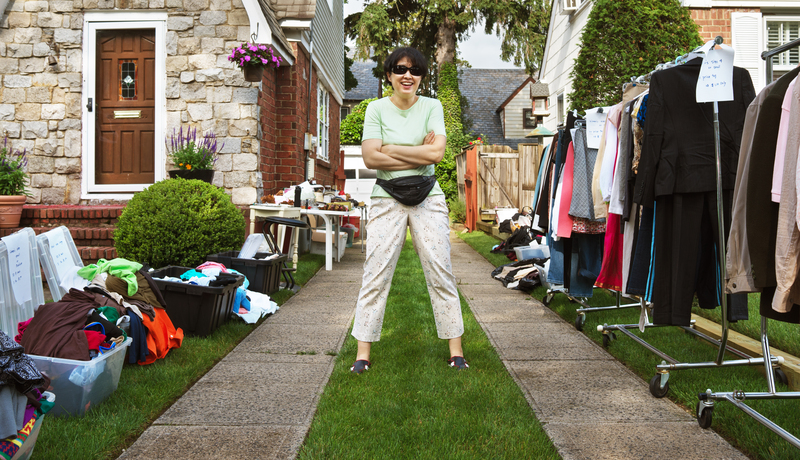Letting Go of Clutter, Embracing Stress Relief
Many people aspire to live in a calm, organized, and peaceful home, yet clutter often accumulates in our living spaces and our lives. Letting go of clutter is not just about tidiness; it's a powerful way to embrace stress relief, enhance mental well-being, and foster a positive environment. This comprehensive guide will walk you through the transformative journey of decluttering, explaining why it matters, the science behind it, and practical steps to start creating an organized and serene space today.
Why Letting Go of Clutter Matters
Living in crowded, disorganized environments isn't just a visual nuisance. Research has shown a strong link between clutter and stress. Excess stuff can overwhelm your mind, hinder productivity, and contribute to anxiety and fatigue. By decluttering, you open up physical and mental space, making room for more energy, creativity, and peace.
- Mental Clarity: A tidy space promotes focus and lowers stress levels.
- Physical Health: Less clutter means fewer allergens and easier cleaning.
- Emotional Balance: Letting go of the past and things you no longer need can be emotionally liberating.
- Time Efficiency: Organized spaces lead to less time wasted searching for lost items.
Science Behind Decluttering and Stress Relief
Research published by the Personality and Social Psychology Bulletin demonstrates that people who describe their homes as cluttered report higher levels of the stress hormone cortisol. In contrast, those who keep an organized living space experience improved mood and heightened productivity. When you embrace stress relief by decluttering, you're actively investing in your own neurobiological well-being.

Identifying the Clutter in Your Life
Clutter isn't only about physical items; it can include emotional baggage, time commitments, and even digital overload. Recognizing what counts as clutter is the first step to reclaiming clarity and serenity. Consider these types of clutter:
- Physical Clutter: Objects piling up on counters, overflowing closets, and items you rarely use.
- Digital Clutter: Unread emails, countless files, and social media distractions.
- Emotional Clutter: Unresolved issues, toxic relationships, or guilt about discarding things.
- Calendar Clutter: Overscheduling, lack of downtime, and commitments that drain your energy.
Assessing Your Personal Clutter Hotspots
Walk through your home with a fresh perspective. Notice the areas where belongings tend to accumulate: the kitchen counters, bedroom closets, entryway tables. Similarly, reflect on your mental space--are there anxieties or unprocessed emotions weighing you down? Letting go of clutter, both physical and emotional, is the first step to embracing a calmer, more authentic lifestyle.
Step-by-Step Guide to Letting Go of Clutter
Ready to start your journey toward a more peaceful home and mind? Here's a step-by-step guide to help you declutter effectively and start embracing stress relief:
1. Set Your Intention
_Ask yourself: "Why do I want to let go of clutter?" Having a clear motivation, such as seeking a more relaxed environment or improving mental health, will keep you focused when challenges arise._
2. Start Small and Stay Consistent
Clutter didn't appear overnight, and it won't disappear overnight either. Begin with one area: a drawer, a closet, or a shelf. Commit to decluttering for 10-15 minutes daily. Small, consistent efforts are more effective and less overwhelming than marathon clean-ups.
3. Use the Four-Box Method
Sort items into these four categories:
- Keep: What you love, use, or need regularly.
- Donate/Sell: Items in good condition you no longer need.
- Trash: Broken, unusable, or expired items.
- Relocate: Items that belong elsewhere.
This method prevents you from simply moving clutter from one place to another and helps you make thoughtful decisions with every item.
4. Practice Mindful Decluttering
As you handle each object, notice how it makes you feel. Does it spark joy, as suggested by Marie Kondo, or does it prompt feelings of guilt, obligation, or stress? Embracing stress relief means learning to release what doesn't serve you, including sentimental items that weigh you down.
5. Address Digital and Emotional Clutter
- Digital Cleanup: Unsubscribe from email lists, organize your desktop, and delete old files to enhance mental clarity. - Emotional Release: Journal, talk to a friend, or seek therapy to work through any emotional baggage you may be carrying.
Psychological Benefits of Decluttering
Studies suggest that decluttering leads to reduced stress, increased happiness, and improved concentration. When your environment is clear, your mind can relax and focus. Here is how letting go of clutter brings these transformative benefits:
- Enhanced Mood: Tidy surroundings promote feelings of satisfaction and accomplishment.
- Improved Sleep: An organized bedroom and less visual chaos can lead to deeper, more restful sleep.
- Boosted Productivity: With less time spent searching for things, you can focus on what truly matters.
- Greater Creativity: Open spaces inspire new ideas and creative energy.
- Lower Anxiety: The sense of control fostered by an organized space reduces overwhelming thoughts.
Clutter and Mental Health
Research indicates a strong connection between clutter, anxiety, and depression. When you embrace stress relief by letting go of clutter, you create a nurturing environment for mental wellness. The act of sorting, deciding, and letting go can even be meditative, offering clarity and emotional release.
Practical Tips for Maintaining a Clutter-Free Life
After investing effort into decluttering, it's important to develop routines to prevent clutter from returning. Here are some actionable strategies to help you maintain serenity and keep stress at bay:
- Adopt a "One In, One Out" Rule: For every new item you bring in, let go of something else.
- Establish Designated Spaces: Every object should have a clear home to avoid misplacing and piling up.
- Regular Decluttering Sessions: Schedule a monthly check-in to reassess your space and needs.
- Practice Mindful Shopping: Avoid impulse buys and ask yourself if you truly need an item before purchasing.
- Digitize Documents: Whenever possible, switch from paper to digital to reduce physical buildup.
Creating a Daily Reset Routine
Take 10 minutes each evening to tidy up. Put items back in their place, recycle papers, and prep for the next day. This simple habit prevents clutter from accumulating and supports a peaceful home environment.
Minimalism and the Art of Living With Less
Minimalism is more than a design trend; it's a lifestyle devoted to pursuing meaning over materialism. By letting go of physical and mental clutter, you can embrace the freedom and calm offered by minimalist living:
- Intentional Living: Own only what adds true value or joy to your life.
- Financial Freedom: Less buying, less maintaining, and less stress related to possessions.
- Environmental Impact: Consuming less reduces waste and supports a more sustainable lifestyle.
Try experimenting with minimalist principles to see the positive impact on both your space and state of mind.
Overcoming Challenges in Letting Go of Clutter
It's normal to encounter emotional and practical roadblocks. You might feel attached to objects due to sentimental value, fear of needing them someday, or guilt over wasted money. Here's how to rise above these hurdles:
- Focus on Your 'Why': Remind yourself of the benefits of embracing stress relief through decluttering.
- Start with the Easy Decisions: Toss expired products or broken items before addressing sentimental ones.
- Take Photos: Preserve the memory without keeping the item.
- Ask for Help: Enlist a supportive friend or professional organizer for tough categories.
- Accept Imperfection: Progress, not perfection, is the goal in letting go of clutter.

The Link Between Letting Go of Clutter and Embracing Stress Relief
Decluttering acts as a physical and symbolic reset. It's a form of self-care that paves the way for more freedom, relaxation, and happiness. When you consciously release unnecessary possessions and obligations, you reclaim control over your environment and emotional state. Letting go is an act of trust--in yourself, and in the present moment.
Stories of Transformation
Thousands have experienced profound benefits by embracing stress relief through letting go of clutter:
- "After years of holding on to my childhood belongings, I finally decluttered. Not only did my room look bigger, but I also felt lighter and more at peace with myself."
- "Digital clutter used to give me anxiety--hundreds of tabs and emails. Once I organized my digital life, my daily stress dramatically dropped."
Conclusion: Unlocking a Life of Clarity and Calm
Letting go of clutter is not just an act of organizing your possessions--it's a path to a healthier, happier you. By embracing stress relief through decluttering, you free your living space, mind, and soul to focus on what truly matters. While the journey takes commitment, the rewards are undeniable: more time, more peace, and more joy. Start small, be patient with yourself, and welcome the transformation that follows.
Take the first step today, and experience how letting go of clutter can unlock a calmer, more fulfilling life.